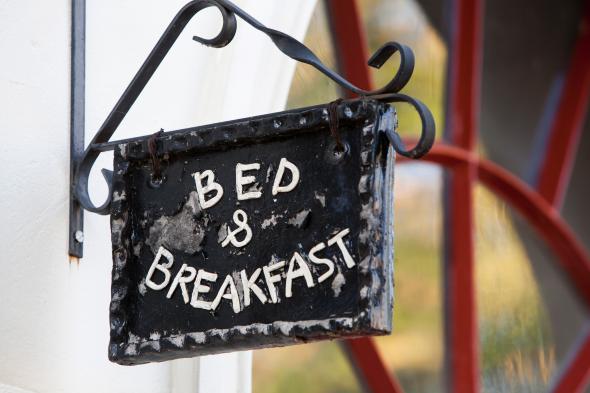Gregory Selden, a Virginia man who has filed a class-action suit against Airbnb, may be the face of #Airbnbwhileblack, the burgeoning movement of black guests who say racial discrimination is rampant on the company’s platform of short-term rentals.
As for the prototypical racist Airbnb host? It turns out the U.S. Congress invented her 50 years ago, with a loophole in the 1964 Civil Rights Act. Title II of that law prohibits discrimination in places of “public accommodation,” including restaurants, theaters, and hotels. But it makes an exception for small-time entrepreneurs running establishments with five or fewer rooms for rent, where the building is “occupied” by the provider.
Sounds a little bit like your typical Airbnb listing, doesn’t it?
It’s called the Mrs. Murphy exemption, after a comment by Republican Sen. George D. Aiken, of Vermont, who suggested that Congress “integrate the Waldorf and other large hotels, but permit the ‘Mrs. Murphys,’ who run small rooming houses all over the country, to rent their rooms to those they choose.”
Selden’s lawyers don’t mention it, because their suit takes aim at Airbnb—not the individual proprietor, a modern-day Mrs. Murphy known to us as Paul from Philadelphia. When Selden tried to book the room through Airbnb last year, Paul told him it was no longer available. Later that day, Selden saw the listing again. He applied using two fake profiles with photos of white men and was accepted in both cases.
To make their case, Selden’s lawyers claim Airbnb is itself the hotel—and Paul is one of the hotel’s agents. The company, as you might expect, identifies itself as a “marketplace,” just as Uber sees itself as a platform, not a taxi company. “As a host,” the company advises in its section on discrimination, “you should be familiar with the laws that apply to you and your listing.” In other words, that’s your job, Paul—not ours.
Which is it? If Airbnb is a hotel, then it’s the largest hotel chain in the world, and there’s no way to see individual hosts as anything but agents of the company. Nancy Leong, a professor at the University of Denver’s Sturm College of Law, summarized that argument: “The company as a whole has an obligation to make sure race discrimination is not happening in its dealings with the public. It doesn’t even matter that there’s a Mrs. Murphy exemption, because Airbnb is renting out a million accommodations.”
Lawyers could also argue that the Airbnb platform—with its required names, photographs, and rating systems—is designed to enable discrimination.
On the other hand, if Airbnb is a value-neutral internet marketplace like Craigslist, the liability for discrimination devolves to the company’s hosts. And despite the proliferation of professionalized, full-time Airbnb users, the bulk of those hosts remain Mrs. Murphy types, with a special congressional license to discriminate.
Airbnb does, in some ways, resemble a hotel. The company, not the host, manages payments for rooms, and ensures that guests pay appropriate local hotel taxes. The company, not the host, contracts for insurance against damages to accommodations. The U.S. hotel industry certainly considers it a peer. One argument that Leong and Aaron Belzer, a law clerk at the Colorado Court of Appeals, have made is a functional one: Airbnb could be legally considered a hotel because it is replacing hotels, and meets the same consumer needs as a hotel. (To make matters more complicated, the Selden suit also accuses Airbnb of violating the Fair Housing Act, which typically pertains to longer-term accommodations, and can be applied against brokers—another apt but imperfect professional comparison for the company.)
Mostly, the suit—and the related semantic struggle over the definition of “hotel”—underscores the extent to which 50-year-old laws are ill-suited to handle the disputes that have arisen around what the U.S. Commerce Department now calls “digital matching firms.”
How could Sen. Aiken have imagined a union of a million Mrs. Murphys, all renting their rooms side by side?
